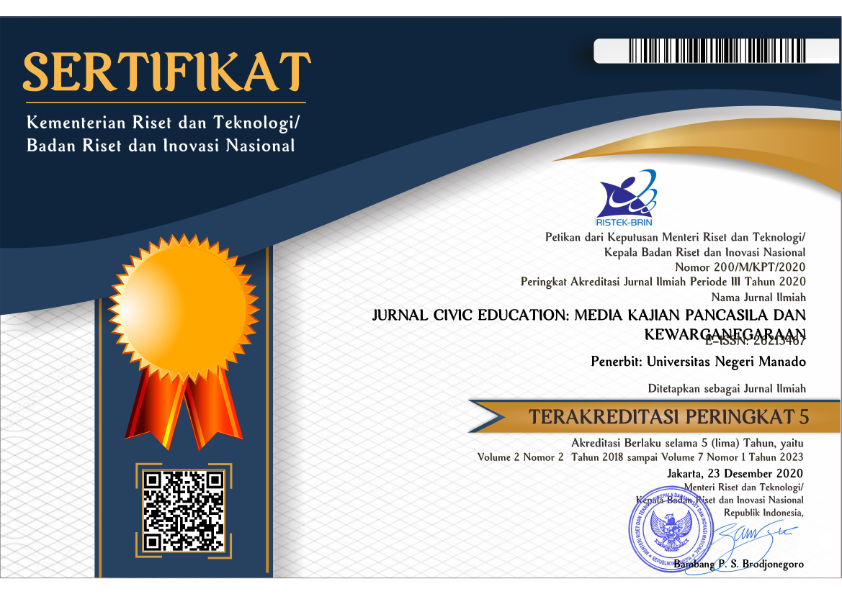Menumbuhkan Siswa Sebagai Warga Global Melalui Media Interaktif Di Sekolah Dasar
 ), Candra Cuga(2), Pratiwi Pratiwi(3),
), Candra Cuga(2), Pratiwi Pratiwi(3),
(1)
(2) Universitas Negeri Gorontalo
(3) Universitas Negeri Gorontalo
 Corresponding Author
Corresponding Author
Abstract
The development of civic education content and learning processes in elementary schools is significant to proportionally accommodate global issues so that students can play a role as citizens and like global citizens. Various approaches and media are being developed. One of them is gamification-based interactive thematic learning media. In previous studies, an analysis of Civics learning at SDN 38 Hulonthalangi was carried out as a vehicle for the formation of students as citizens of the world. The research found a picture of the learning that was not optimal in developing student competencies as global citizens. So that the author conducts collaborative research with students in developing interactive learning media and produces interactive multimedia designs in the form of an Android-based application to know the world. This study aims to develop media and content-oriented to the Basic Competencies of Civics in the Globalization Theme in Class VI, by adopting and modifying Thiagarajan's research methods, namely define, design, develop, and dissimination. The results of this study are to test the feasibility of the application, namely by validating the application to a team of experts and has obtained an average percentage value of 93.05% for media and 93.75% for the material. Based on the results of this study, an Android-based application to know the world is very suitable to be used in the process of learning the theme of globalization for class VI and is believed to be part of the process of preparing students as global citizens in elementary schools.
References
Ameliola, S., & Nugraha, H. D. (2013, June). Perkembangan media informasi dan teknologi terhadap anak dalam era globalisasi. In Prosiding In International Conference On Indonesian Studies" Ethnicity And Globalization.
Arsyad, A. (1997). Media Pembelajaran, Cet. I; Jakarta: PT. Raja Grafindo Persada.
Basori, M. (2016). Pengembangan multimedia interaktif untuk mata pelajaran ilmu pengetahuan sosial (IPS) sekolah dasar kelas V. Jurnal Pendidikan Dasar Nusantara, 1(2).
Budiman, H. (2017). Peran teknologi informasi dan komunikasi dalam pendidikan. Al-Tadzkiyyah: Jurnal Pendidikan Islam, 8(1), 31-43.
Haryono, N. D. (2015). Pengembangan Multimedia Interaktif Sebagai Media Pembelajaran IPS Bagi Siswa Kelas IV SD Negeri Tegalpanggung. BASIC EDUCATION, 4(17).
Mayer, Richard. E. (2009). Multimedia Learning. Yogyakarta: PustakaPelajar.
Novitasari, D. (2016). Pengaruh penggunaan multimedia interaktif terhadap kemampuan pemahaman konsep matematis siswa. FIBONACCI: Jurnal Pendidikan Matematika Dan Matematika, 2(2), 8-18.
Sugiyono, M. P. P., & Kuantitatif, P. (2009). Kualitatif, dan R&D, Bandung: Alfabeta. Cet. Vii.
Sumaryati (2016). Penguatan Pendidikan Karakter Untuk Mewujudkan Warga Negara Global. Seminar Nasioanal Kongres dan Deklarasi AP3KnI.
Suyantiningsih, S., Munawaroh, I., & Rahmadona, S. Pengembangan Multimedia Pembelajaran Berbasis Scientific Approach Terintegrasi Nilai Karakter Untuk Siswa Sekolah Dasar Di Yogyakarta. Jurnal Kependidikan: Penelitian Inovasi Pembelajaran, 46(1), 1-13.
Urnika, A. (2020). Pengembangan Multimedia Interaktif Berbasis Adobe Flash Muatan Pembelajaran PPKN Materi Keberagaman Budaya Indonesia Kelas IV SD NEGERI Patemon 01 Kota Semarang (Doctoral dissertation, Unnes).
Article Metrics
Abstract View : 197 times
: 197 timesPDF (Bahasa Indonesia)
 Download : 39 times
Download : 39 times
DOI: 10.36412/ce.v5i2.3031
Refbacks
- There are currently no refbacks.
Copyright (c) 2021 Jurnal Civic Education: Media Kajian Pancasila dan Kewarganegaraan

This work is licensed under a Creative Commons Attribution-NonCommercial 4.0 International License.










